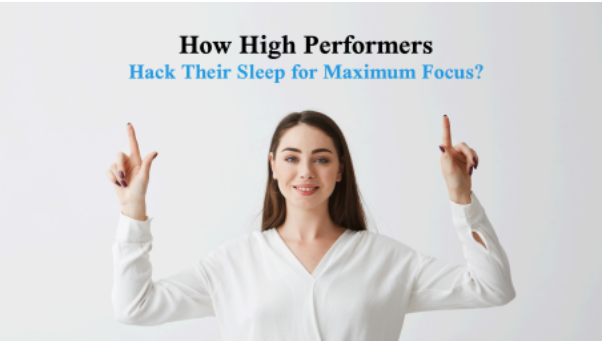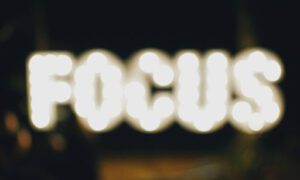Sleep is a biological state of reduced physical and mental activity where the body and brain undergo critical functions. It directly influences active brain work, important for memory consolidation, emotional regulation, physical recovery, and, most importantly, for high performers’ mental clarity and focus. Even a small reduction in sleep quality or quantity can impair your judgment and output. In contrast, well-structured sleep leads to faster problem-solving, better retention, and sharper execution. But it’s not just about logging hours in bed, but getting quality sleep. Elite performers approach sleep with the same level of intention they bring to their work. They hack their sleep, optimizing it to function as a strategic tool for sustained focus, creativity, and decision-making.
For most high performers, the path to sharper focus starts with fine-tuning sleep habits, not with more coffee, but with smarter rest. Here’s how the best of the best are doing it.
11 Hacks To Sleep Better
Here are 11 powerful sleep hacks high performers use to maximize focus and productivity.
- Prioritize Sleep
Circadian rhythm is the body’s natural 24-hour internal clock that regulates sleep-wake cycles. It prompts you to go to bed and wake up at roughly the same time each day, even on weekends. A consistent 7–9 hour window outperforms late-night marathons.
Jeff Bezos, for instance, is famously protective of his 8 hours of sleep, stating it helps him make high-quality decisions. Arianna Huffington, founder of Thrive Global, changed her life and company after collapsing from sleep deprivation, becoming an advocate for treating sleep as a cornerstone of performance.
A 2017 study published in Scientific Reports found that irregular sleep patterns were associated with lower academic performance among college students, suggesting a strong link between consistent sleep timing and cognitive function.
Tip #1: Set a consistent bedtime and wake time even on weekends. This anchors your circadian rhythm and maximizes the quality of your rest.
- Understand Your Chronotype
A chronotype is the body’s natural sleep preference. It determines when people feel most awake or sleepy. Dr. Michael Breus, a clinical psychologist and sleep expert, classifies people into four chronotypes:
- lions (early risers),
- bears (day-oriented),
- wolves (evening people), and
- dolphins (light sleepers).
Knowing your type helps you align your most important cognitive work with your natural periods of alertness.
Tip #2: Take a chronotype quiz (available online) and adjust your schedule so your peak focus hours match your most challenging tasks.
- Control Light Exposure
Light is the most powerful external cue that affects the circadian rhythm. High performers use this to their advantage. Morning sunlight triggers wakefulness by suppressing melatonin, a hormone that regulates sleep-wake cycles. Evening blue light (from screens and artificial lighting) delays sleep by mimicking daylight. To sleep better, elite performers actively manage their exposure to light.
Tip #3:
- Get at least 15–20 minutes of sunlight within the first hour of waking. ● Use blue light blockers or apps designed to reduce eye strain after sunset. ● Dim indoor lights 1–2 hours before bed.
- Master Pre-Sleep Rituals
The highest performers have wind-down routines that signal to their body and brain that it’s time to sleep. These habits reduce cortisol (the stress hormone) and promote melatonin production.
Here are a few examples to include in your pre-sleep ritual.
- Light stretching or yoga
- Journaling to brain-dump thoughts
- Reading fiction (no work-related material)
- Herbal teas like chamomile or jasmine
- Listening to calming music or white noise
Tip #4: Build a 30-minute bedtime ritual that’s consistent, calming, and screen-free.
- Use Strategic Napping
Strategic napping is the practice of taking short, planned naps at specific times to boost alertness, performance, and mood without wrecking your nightly sleep. A NASA study showed that a 26-minute nap can improve alertness and performance. High performers use short naps to recharge, not replace night sleep. Longer naps (60–90 minutes) can enter REM sleep, improving creativity and memory, but can cause sleep inertia (grogginess).
Tip #5: Schedule short naps (10–20 minutes) during early afternoons, preferably around 1–3 p.m.
- Track Sleep Metrics
Sleep metrics are measurable data points that track and assess the quality, quantity, and patterns of your sleep, such as how long you sleep, how often you wake up, how deep your sleep is, and how consistent your sleep schedule is.
High performers use sleep-tracking tools and wearable devices to monitor their sleep patterns and adjust habits accordingly. Analyzing this data helps them make informed decisions about adjusting their routines for better recovery and focus. A 2021 study in Frontiers in Psychiatry found that wearable sleep trackers can effectively monitor sleep quality and aid in behavioral interventions.
Tip #6: Use a wearable or app to track sleep quality for a few weeks. Identify patterns, such as whether late dinners disrupt deep sleep or if alcohol reduces REM sleep. Utilise data to make adjustments.
- Optimize Sleep Environment
Optimising your sleep environment means setting up your bedroom and surroundings in a way that makes falling asleep and staying asleep way easier. High performers optimize their sleep environments to minimize disruptions and encourage restful sleep.
Follow these steps to get optimal sleep.
- Darkness: Blackout curtains or sleep masks block light.
- Temperature: 60–67°F (15–19°C) is ideal.
- Noise: White noise machines or earplugs cut down disruptions.
- Mattress and pillows: Customized to personal preference and spinal alignment.
Roger Federer reportedly sleeps 10–12 hours a day and travels with his own mattress and bedding to ensure sleep consistency.
Tip #7: Audit your bedroom. Make it cold, dark, and quiet. Invest in a high-quality mattress as you’re spending a third of your life there.
- Prioritizing Sleep Hygiene
Sleep hygiene refers to behaviors that facilitate good sleep quality. High performers practice strong sleep hygiene consistently. Avoid caffeine and heavy meals within 3–4 hours of bedtime. Limit alcohol consumption, which disrupts REM sleep. Turn off electronic devices at least one hour before sleep to avoid blue light exposure, which can suppress melatonin.
Research published in the Journal of Clinical Sleep Medicine in 2016 showed that minimizing blue light exposure before bed significantly improved sleep quality.
Tip #8: Cut off caffeine after 2 PM. Eat your last meal at least 2–3 hours before bed. Avoid alcohol or limit it to earlier in the evening.
- Leverage Medication Wisely
In certain cases, high performers may experience persistent excessive daytime sleepiness due to conditions such as narcolepsy. Narcolepsy is a chronic sleep disorder characterized by overwhelming drowsiness and sudden sleep attacks. In such instances, under medical supervision, pharmacological treatment becomes essential.
Common narcolepsy medications include Modafinil and Armodafinil. These are wakefulness-promoting agents often prescribed to manage sleep disorders like narcolepsy and shift work sleep disorder. They are known to improve alertness without causing significant sleep disruption.
Tip #9: Always consult a doctor before starting anything new. Use medication as prescribed by your doctor to help regulate sleep during disruptions.
- Protect Morning Focus
The morning after a good sleep is important for mental clarity and creativity. Below is a list of what to avoid for the best sleep.
- Checking email or social media first thing
- Jumping into meetings or distractions
- Avoid caffeine on an empty stomach
Instead, practice the steps mentioned below.
- Meditate or journal
- Review goals
- Engage in focused deep work
Tip #10: Use your first 90 minutes for your most important cognitive tasks. Your brain is sharpest, and the world is quietest.
- Practicing Relaxation Techniques Before Bed
Practicing relaxation techniques before bed involves using methods like meditation, deep breathing, mindfulness, or muscle relaxation to quiet the mind and body, making it easier to transition into sleep. Stress is one of the major obstacles to quality sleep. High performers often use these methods to fall asleep faster and stay asleep longer.
A meta-analysis by the American Psychological Association (2020) concluded that mindfulness-based stress reduction (MBSR) techniques significantly improve sleep quality.
Techniques like the 4-7-8 breathing method or guided meditation apps (e.g., Calm, Headspace) are commonly used. While practicing the 4-7-8 breathing method, you inhale for 4 seconds, hold your breath for 7 seconds, and exhale slowly for 8 seconds to calm the mind and body.
Tip #11: Spend 10–15 minutes practicing relaxation techniques every night.
High performers aren’t superhuman because they sleep less, they’re exceptional because they sleep better. In fact, improving your sleep may be the single most efficient productivity hack available. It requires no tools, subscriptions, or investments. You only need intention, awareness, and a commitment to quality over quantity.

































